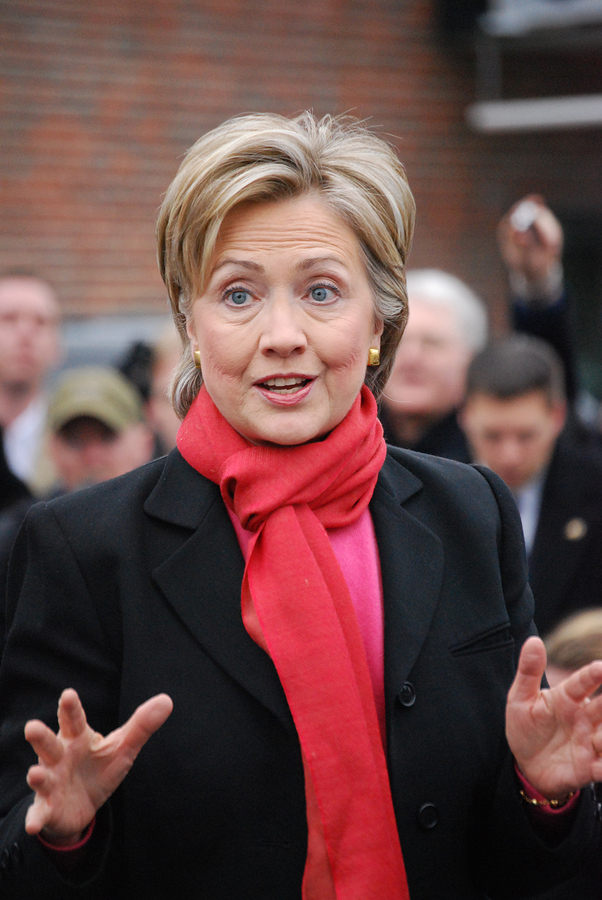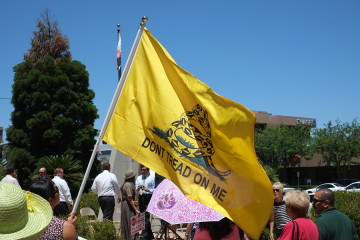Can Ellen DeGeneres Give Hillary Clinton What She Needs Most?

©2015 Bloomberg News
NUE2WE6S972E
(Bloomberg Politics) — “You can just be silly here,” an executive producer of the The Ellen DeGeneres Show said of the talk show before Hillary Clinton took a plush white seat as Ellen’s guest on an outdoor stage set up at New York’s Rockefeller Plaza. It was the Tuesday after Labor Day: the rare moment that New Yorkers actually welcome ninety-degree heat, for dread of putting away linen and pulling out autumnal tweed. Back to school for children, back to Capitol Hill after the summer recess for members of Congress, and, for politicians of a certain national stature or aspiration, back to the prime-time, weekday TV. Massachusetts Senator Elizabeth Warren appeared Tuesday afternoon on The View, and former Florida Governor Jeb Bush was scheduled to join Stephen Colbert that night for his Late Night debut. And here was Clinton, the former secretary of state, in bright Yves-Klein blue, outside for her first talk- show appearance since announcing her candidacy, on the same day that the New York Times related she was trying to project more humor, more heart.
On Tuesday, Clinton spoke with a new kind of frank contrition in an ABC interview, apologizing for her use of a private server for her State Department e-mail. Later in the day, she chatted with Ellen about being a grandma, about her favorite plot line on Scandal(First Lady Mellie Grant’s run for Senate), about equal rights and college affordability, about the Republican debate. She bopped her head to anthemic New York songs. She joked with the comedian Amy Schumer about ice skates. She swayed with the singer Pink. She took pictures with a five- year old “presidential expert.” She rolled her hands and did a dance resembling the nae nae with the DJ tWitch from “Magic Mike XXL.” In other words, she put in time in the service of being likable.
And Ellen DeGeneres helped her.
DeGeneres began, after thanking Clinton for wearing “Ellen blue,” by asking Clinton about a Kanye West candidacy. (Clinton replied, “I heard him make the announcement. He said he wanted to run in 2020. I would only ask him, if I’m running for reelection, to wait.”) Everyone’s running for president, the two opined. DeGeneres added that she cannott understand why. “You think hosting the Oscars is thankless?” she joked. “Being president of the United States, you’re just constantly criticized and attacked and scrutinized.” She used that as a bridge to ask Clinton about the controversy surrounding her e- mails.
Clinton, who seemed to have pleasantness and stubborn likability poll numbers in mind, forced a smile. “I want people to understand this,” she said, “so I’m glad you asked I used a personal e-mail account it was allowed by the state department but I should have used two different accounts. I made a mistake. And I’m sorry for all the confusion that has ensued. I take responsibility for that. But I’m now trying to be as transparent as not just I can but as anybody ever has been.” As if by design, nearby church bells happened to chime. “So fifty-five thousand pages have been turned over to be released, and then we’ve got the server, and then we’ve got me testifying before Congress. So,” she said, pleased to move on with speed. “I’m going to keep talking about it and answering questions.”
Ellen looked at her guest, and said, “I actually don’t think you need to, it’s just that people keep bringing it up. They have not found a thing,” she continued. And then, “I personally believe that women are held to a different standard than men. We are held to a different standard for our weight, for our age, for our looks.”
According to Nielsen, nearly 55 million adults watched Ellen last year, in part or in whole, on TV or online. The bulk of these viewers are women—women who may not share the media diet that much of campaigning is built around. Ellen consistently said that she doesn’t understand why people run for office, that she doesn’t like politics. But she and Clinton the politician have something in common. The two both appeared in May on Forbes’s list of “The World’s 100 Most Powerful Women” (Clinton as #2, DeGeneres as #50). They’ve worked together, too; for years ago, when Clinton was secretary of state, she named DeGeneres Special Envoy for Global AIDS awareness.
On Tuesday, it felt like DeGeneres was returning the favor. During their interview, which will be broadcast on Thursday afternoon, she helped Clinton paint herself as not only a tireless advocate, but a sensible option, maybe the only sensible option. “You are the smartest, most qualified person for this job,” DeGeneres said, in her excited way. “If I’m looking for someone who’s qualified,” she trailed off, then employed a metaphor. “If I want to hire a plumber, I’m looking for someone who’s snaked a drain before,” she said. “You know what I’m saying?” She took a pause. “I think you know what I’m saying. I want someone who is qualified. And I feel like, when I look at all the other candidates, someone who is for rights across the board, equal rights for women. Equal rights for every ethnicity. Equal rights for everyone. The only person I could look at is you.”
When DeGeneres came out on stage, it was as though Tinkerbell had appeared. The harder the audience claps, the more she lights up. Call it mutually beneficial symbiosis: the audience eats her up, and it feeds her, too. Sse brings them higher. In fact, the official crowd pumper-upper, the sort of comedy fluffer who appeared before DeGeneres took the stage, asked the giddy crowd to get out their cheers, claps, and maybe catcalls beforehand. “Let’s just laugh together,” he said.
This is the opposite of what Clinton elicits at this stage in the campaign. DeGeneres appears to be all enthusiasm, all delight, all spontaneity. Clinton recounts quite personal anecdotes about singing to her daughter, about her husband’s allergies to Christmas trees—and even these feel a tad forced. She relies on the same (charming) laugh lines: speaking of what her granddaughter Charlotte might call her, she offered a couple of options. “I’m fine with grandma,” she said. “I’m fine with Madame President.” She is careful. She is deliberate. Such is the tactical necessity of a woman in power—a woman of a certain age, maybe, but also a woman of a certain number of years in the public eye, looking for votes. We know her. On the other hand, the Ellen DeGeneres Show may be in its 13th season, but it still feels fresh.
DeGeneres brought to the stage a five-year old “presidential expert” and semi-sasspot Macey Hensley from Council Grove, KS, to talk trivia, tabasco, and first ladies. Hensley and Clinton established a shared love of Amelia Bedelia. DeGeneres gave her a pantsuit that matched Clinton’s own. All perfectly cute.
But it did feel canned.
What may have been more powerful, if less photographed, was the moment Clinton addressed the audience, telling “all these wonderful beautiful young women who are here: don’t get discouraged, don’t give in, don’t give up, don’t quit.”
She said: “Look, I’m not asking for people to vote for me because I’m a woman, but I think if you vote for someone on the merits, one of my merits is I’m a woman.
Amy Schumer was there, too, and after she came out and feigned ice skating in a glitzy, mermaid-like outfit on stage, Clinton said, “I love her.”
And who doesn’t?
Then a moment later, Clinton added, “And I love what she’s doing with gun violence.”
This is what it is to be Hillary Clinton. Talking politics is, ultimately, indistinguishable from projecting warmth. Ellen DeGeneres says she doesn’t get politics, but about Clinton, she gets this. It’s one of the reasons it helps Hillary to have Ellen around.
To contact the author of this story: Emily Greenhouse in New York at egreenhouse@bloomberg.net To contact the editor responsible for this story: David Knowles at dknowles9@bloomberg.net







No Comment